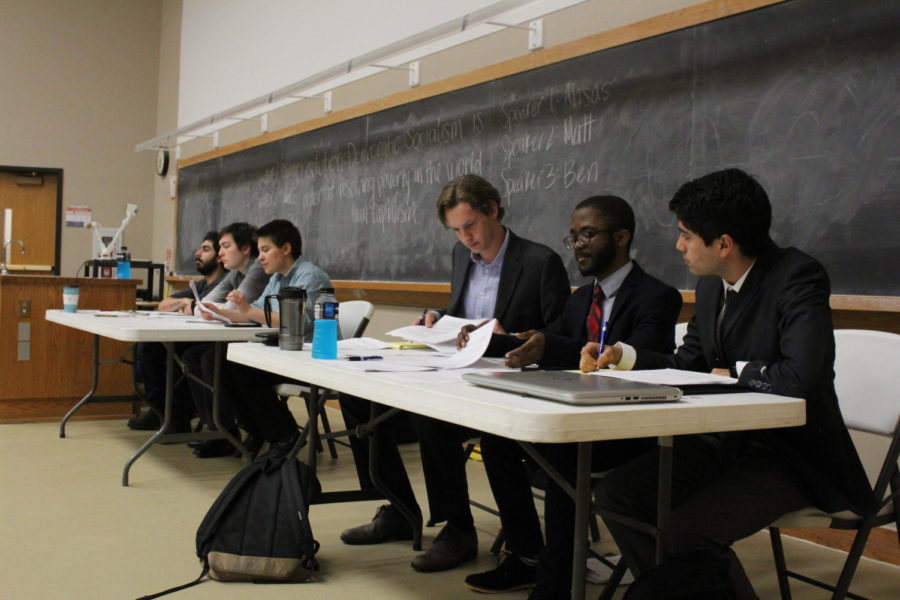Student groups debate global poverty resolution
Two sides debate over the resolution: “Democratic Socialism is better at resolving poverty in the world than capitalism” in Physics Hall on April 18.
April 18, 2017
Tempers flashed and ideals clashed Tuesday night in Physics Hall, where two student groups put their philosophies to the test before an audience of nearly a hundred students.
World poverty, worker exploitation and the uncertain future of automated labor made for polarizing issues at the debate, but the main focus was what is the best way to enrich the lives of the impoverished worldwide?
The two sides, Young Democratic Socialists (YDS) and Turning Point USA (TPUSA), have contrasting ideas on how this should be resolved.
“Capitalist systems are more effective and efficient at solving poverty,” Ahsas Bermudez, debater for TPUSA, said.
Bermudez and his cohorts, Ben Whittington and Matt Tjaden, believe in the free market and said GDP growth is the premiere statistic concerning poverty reformation.
GDP stands for gross domestic product. It refers to the amount of goods a country’s economy produces over the course of a given time.
“[The Economist] finds that every 1 percent increase of GDP per capita reduces poverty by 1.7 percent,” Bermudez said.
Bermudez’s GDP data failed to impress Danny Cook, a debater for YDS.
“How can GDP growth possibly help those who are unable to work?” Cook asked.
“If they’re creating value, they will be able to work,” Bermudez replied.
Cook, along with fellow YDS debaters David Filip and David Karayof, contested that free market capitalism is only concerned with generating increased profits for a wealthy few, meaning workers’ rights take a back seat to capital gain.
Tjaden argued that capitalism allows people the opportunity to overcome poverty through social mobility. Social mobility is the ability for one to ascend to different socio-economic classes.
Tjaden said 95 percent of people among the poorest fifth class of Americans are able to rise to higher economic classes within 15 years, thanks to capitalism.
“If the only motivation of capitalism is to make profits, you’d see a lack of this social mobility,” Tjaden said.
Tjaden then pointed out that the outsourcing of jobs to sweatshops overseas technically provides a higher standard of living than most domestic jobs in impoverished nations.
“[Corporations] don’t go overseas to provide higher wages,” Filip said. He and Cook then described how corporations exploit foreign workers by offering them wages and working conditions Americans have deemed unconstitutional.
According to YDS, the power should be in the hands of the people in any democracy. The group also insists money is a form of power, meaning the people should decide how wealth gets redistributed.
Whittington and his colleagues argue the solution to global poverty shouldn’t be to “take other people’s capital and ability to choose in a free market.”
“Instead of seizing the means of production we should incentivize [the impoverished] to work,” Whittington said.
Cook and Karayof believe that wealth is inherently a social concept, insisting nobody truly generates wealth wholly by themselves: They rely on roads, machinery, education and other things supplied by the entire population.
YDS raised the issue of worker automation, saying, “It’s not a matter of if, but when” massive amounts of jobs are replaced by a robotic work force.
“Under capitalism, automation is a tragedy because people lose their jobs and can’t afford to eat,” Karayof said. “Under socialism, this problem doesn’t exist.”
Turning Point admitted that the problems that worker automation may bring are daunting, but the group still believes the issues will be resolved by the self-regulating nature of capitalism.







